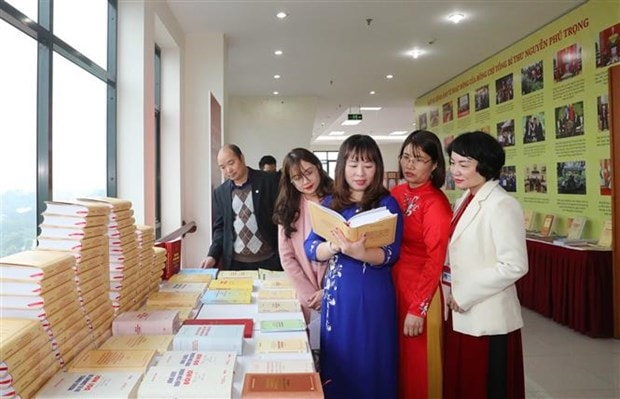General Secretary Nguyen Phu Trong's book: Code of Conduct on Anti-Corruption
The book points out the consistent viewpoints of the fight against negative corruption: proactively detect and strictly handle, with no forbidden zones and no exceptions.
 |
| The book “Resolutely and persistently fight against corruption and negativity, contributing to building our Party and State increasingly clean and strong” by General Secretary Nguyen Phu Trong. Photo: Phuong Hoa/VNA |
The book of General Secretary Nguyen Phu Trong"Resolutely and persistently fight against corruption and negativity, contributing to building our Party and State to be increasingly clean and strong"received special attention and reception from cadres, party members and the masses.
Code of conduct on preventing and combating corruption and negativity
Referring to the content of the book, Dr. Pham Huy Thong - Permanent Vice Chairman of the Vietnam Catholic Solidarity Committee in Hanoi City said that this is a summary of the rules for the fight against corruption and negativity in our country. The book also points out the consistent viewpoints of the fight against corruption and negativity: "Proactively detect and strictly handle, no forbidden areas, no exceptions, regardless of who the person is and not subject to pressure from any individual".
This struggle cannot be done alone but must be linked with the fight against ideological and political degradation, lifestyle ethics, self-evolution, and self-transformation.
The book points out that the purpose of the fight against corruption and negativity is to "build our Party and State to be increasingly clean and strong" as the title of the work.
As General Secretary Nguyen Phu Trong said at the closing ceremony of the 13th Congress: "The Congress is just the beginning. Whether it can be done or not, whether the Resolution can be turned into a vivid reality or not, whether it can create material wealth, bring wealth and happiness to the people or not, that is the actual success of the Congress."
Dr. Pham Huy Thong emphasized that the fight against corruption and negativity has achieved many valuable results, but to be more effective, it is necessary to reduce the areas that the State does not need to hold but to transfer to shares because corruption mainly occurs in the areas managed by the State. In addition, it is necessary to commend and reward journalists and press agencies that have contributed to investigating and detecting corruption and negativity cases.
Most impressed with one of the articles in the book, Dr. Pham Huy Thong shared the speech of the General Secretary at the 18th meeting of the Central Steering Committee on anti-corruption in 2020. The content of the speech showed the high determination of the Party and State in fighting corruption "with no forbidden zones, no exceptions, regardless of who the person is, without pressure from any individual".
In his speech, the General Secretary stated: "Recently, we have done a lot of work, from inspection, examination, and auditing work being strengthened, to strict discipline and public disclosure of many officials who have committed violations, including high-ranking officials, incumbent officials, retired officials, and officials related to the Party Congress personnel, without exception. But while doing so, we still have the awareness to protect officials and be humane. The investigation, prosecution, and trial work has been directed resolutely, with no forbidden areas, no exceptions, very strict but also very humane."
Some of the General Secretary’s statements also emphasized that fighting goes hand in hand with prevention and, more importantly, there needs to be a mechanism to prevent corruption from growing. Along with focusing on directing the work of handling corruption, investment is also being made in building and perfecting institutions, step by step, so that officials cannot, do not dare, do not want and do not need to be corrupt.
Building a clean and strong political system
Master Bui Kim Dong - Center for Research and Development of Agricultural Systems, Vietnam Academy of Agricultural Sciences, said that based on the summary and in-depth analysis of practice and theory on the nature of corruption and negativity, identifying behaviors, manifestations and consequences, the book has clearly pointed out the difficult and complicated nature of the work of fighting against corruption and negativity.
The book truly and profoundly reflects the General Secretary's steadfast, consistent and thorough ideology on Party building and rectification, and training the ethics and lifestyle of cadres and Party members. The struggle to prevent and repel degradation within the Party is a vital, primary and necessary political task.
At the same time, the book also points out limitations and shortcomings to draw experiences and summarize profound lessons in the fight against corruption and negativity.
 |
| Visiting the book exhibition of General Secretary Nguyen Phu Trong. Photo: Phuong Hoa/VNA |
According to Master Bui Kim Dong, Party building and rectification is a key task that determines the survival of the regime, national security, national defense, national prosperity, and the cause of innovation and national development. This task must be appropriate to each period and social context at home and abroad. This issue has both theoretical and practical significance in continuing to promote Party building and rectification, building a socialist rule-of-law state and a clean and strong political system, contributing to preventing and repelling degradation in political ideology, ethics, lifestyle, and manifestations of "self-evolution" and "self-transformation".
This issue is also of vital significance to the Party's leadership and governance role and to the people's interests, to better maintain close relations with the people, to arouse creative potential and aspirations for national development, to promote people's mastery, to attract the people's sympathy, support, and aspirations.
To do a good job in preventing and combating corruption and negativity, Master Bui Kim Dong said that the work of preventing and combating corruption and negativity needs to be implemented continuously, drastically, and relentlessly; continue to promote the role of people in mastery and supervision. At the same time, applying preventive solutions, the results of preventing and combating corruption and negativity must be public, transparent, strong administrative reform, attaching importance to inspection and supervision of sensitive areas, areas prone to negativity; handling violations more seriously and decisively.


